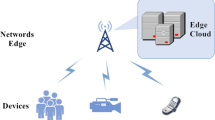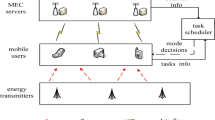Abstract
This paper considers a wireless energy transfer based mobile edge computing system, where wireless devices can be charged by the radio-frequency signals broadcast by hybrid access point. With Mobile Edge Computing (MEC), wireless devices can execute their computation tasks locally or offload them to the MEC server by time division multiple access protocol. Based on this system, this paper studies the problem of system energy efficiency maximization by joint optimization of computing time allocation, energy consumption, capacity of local computing and task offloading. A Tabu search based system energy efficiency maximization algorithm is proposed for solving the optimization problems. Finally, the performance of the proposed algorithm is valued by extensive simulation experiments. Simulation results verify the effectiveness of the proposed algorithm.







Similar content being viewed by others
References
Shi W et al (2016) Edge computing: vision and challenges[J]. IEEE Internet Things J 3(5):637–646
Tran TX, Hajisami A, Pandey P et al (2017) Collaborative mobile edge computing in 5G networks: new paradigms, scenarios, and challenges[J]. IEEE Commun Mag 55(4):54–61
Mao Y, You C, Zhang J et al (2017) A survey on mobile edge computing: the communication perspective[J]. IEEE Commun Surv Tutorials 19(4):2322–2358
Ngu AH, Gutierrez M, Metsis V et al (2017) IoT middleware: a survey on issues and enabling technologies[J]. IEEE Internet Things J 4(1):1–20
Yue LC, Duan L, Rui Z (2014) Spatial throughput maximization of wireless powered communication networks[J]. IEEE J Sel Areas Commun 33(8):1534–1548
Kim B, Kang JM, Kim HM et al. (2016) Max-min energy-efficiency optimization in wireless powered communication network with harvest-then-transmit protocol[C]. International conference on IT convergence and security (ICITCS). IEEE, pp. 62–66
Bi S, Ho CK, Rui Z (2014) Wireless powered communication: opportunities and challenges[J]. IEEE Commun Mag 53(4):117–125
Bi S, Zeng Y, Zhang R (2016) Wireless powered communication networks: an overview[J]. IEEE Wirel Commun 23(2):10–18
Liu J, Mao Y, Zhang J et al. (2016) Delay-optimal computation task scheduling for mobile-edge computing systems[C]. International symposium on information theory (ISIT). IEEE, pp. 1451–1455
Mao Y, Zhang J, Letaief KB (2016) Dynamic computation offloading for mobile-edge computing with energy harvesting devices[J]. IEEE J Sel Areas Commun 34(12):3590–3605
Zhang K, Mao Y, Leng S et al. (2017) Optimal delay constrained offloading for vehicular edge computing networks[C]. IEEE International conference on communications (ICC). IEEE, pp. 1–6
Zhang H, Guo J, Yang L et al. (2017) Computation offloading considering fronthaul and backhaul in small-cell networks integrated with MEC[C]. IEEE conference on computer communications workshops (INFOCOM WKSHPS). IEEE, pp. 115–120
You C, Huang K (2016) Multiuser resource allocation for mobile-edge computation offloading[C]. IEEE global communications conference (GLOBECOM). IEEE, pp. 1–6
Chen X, Jiao L, Li W et al (2015) Efficient multi-user computation offloading for mobile-edge cloud computing[J]. IEEE/ACM Trans Networking 24(5):2795–2808
Lin X, Huang L, Guo C et al (2017) Energy-efficient resource allocation in TDMS based wireless powered communication networks[J]. IEEE Commun Lett 21(4):861–864
Ji L, Guo S (2018) Energy-efficient cooperative resource allocation in wireless powered mobile edge computing[J]. IEEE Internet Things J 13(2):1–12
Ding J, Jiang L, He C (2018) User-centric energy-efficient resource management for time switching wireless powered communications[J]. IEEE Commun Lett 22(1):165–168
You C, Huang K, Chae H et al (2017) Energy-efficient resource allocation for mobile-edge computation offloading[J]. IEEE Trans Wirel Commun 16(3):1397–1411
Wang F, Xu J, Wang X et al (2018) Joint offloading and computing optimization in wireless powered mobile-edge computing systems[J]. IEEE Trans Wirel Commun 17(3):1784–1797
Kim B, Kang JM, Kim HM et al. (2016) Energy efficiency optimization in multi-antenna wireless powered communication network[C]. International conference on information and communication technology convergence (ICTC). IEEE, pp. 756–758
Do T, Nguyen V, Shin O et al (2019) Simultaneous uplink and downlink transmissions for wireless powered communication networks[J]. IEEE Commun Lett 23(2):374–377
Wang F (2017) Computation rate maximization for wireless powered mobile edge computing[C]. Asia-Pacific conference on communications (APCC). IEEE, pp. 735–740
Lee S, Zhang R (2017) Distributed wireless power transfer with energy feedback[J]. IEEE Trans Signal Process 65(7):1685–1699
Wu Q, Tao M, Ng DWK et al (2015) Energy-efficient resource allocation for wireless powered communication networks[J]. IEEE Trans Wirel Commun 15(3):2312–2327
Liu P, Gaochao X et al (2018) Joint optimization for residual energy maximization in wireless powered mobile-edge computing systems[J]. Ksii Trans Int Inf Syst 12(12):5614–5633
Hong Xing, Liang Liu et al. (2018) Joint task assignment and wireless resource allocation for cooperative mobile-edge computing[C]. International conference on communications (ICC). IEEE, pp. 1–6
Hussein et al. (2015) Experimental modeling and analysis of lithium-ion battery temperature dependence[C]. IEEE applied power electronics conference and exposition (APEC). IEEE, pp. 1084–1088
Acknowledgments
The work was supported by the National Natural Science Foundation (NSF) under grants (No.61873341, No.61672397), Application Foundation Frontier Project of WuHan (No. 2018010401011290), National Key R&D Program of China (No.2018YFE0101000) and Open Fund of Shanghai Key Laboratory of Multidimensional Information Processing, East China Normal University (Grant No. 2019KEY003)”. Any opinions, findings, and conclusions are those of the authors and do not necessarily reflect the views of the above agencies.
Author information
Authors and Affiliations
Corresponding authors
Additional information
Publisher’s note
Springer Nature remains neutral with regard to jurisdictional claims in published maps and institutional affiliations.
Rights and permissions
About this article
Cite this article
Li, C., Song, M., Zhang, L. et al. Offloading Optimization and Time Allocation for Multiuser Wireless Energy Transfer Based Mobile Edge Computing System. Mobile Netw Appl 27, 1783–1791 (2022). https://doi.org/10.1007/s11036-019-01396-3
Published:
Issue Date:
DOI: https://doi.org/10.1007/s11036-019-01396-3




